“The Grand Duchy of Luxembourg today has a positive tendency to want to take this step and recognise the State of Palestine in September.” Foreign minister ’s (DP) speech at the plenary assembly of the International Conference on the Peaceful Settlement of the Question of Palestine and the Implementation of the Two-State Solution, which took place on Monday 28 and Tuesday 29 July at the United Nations headquarters in New York, is one of those that counts. Bettel clearly followed in the footsteps of France, which, through the voice of president Emmanuel Macron, has said it is ready to recognise two states.
“People say to me: ‘Yes, but will it change anything?’ Because a year and a half ago, Slovenia, Norway, Spain and Ireland had already done it. And I’ve seen the flags, and it hasn’t changed much. But I hope that this dynamic, this time, will really enable us to move forward,” urged Luxembourg’s deputy prime minister during his six-minute speech.
“The commitment of the Palestinians is an enormous step. And this willingness on the part of Muslim and Arab countries to say: ‘We condemn Hamas, we demand demilitarisation,’ these are things we could not have imagined yesterday,” he continued. “So we must not miss this momentum,” he insisted. “And one day, our Israeli colleagues will have to understand that Israel’s security will depend on peace in Palestine. And that saying today that we want to support Palestine is not an act against Israel. On the contrary, it is for the sake of a secure future for Israeli generations.”
“A divisive situation”
Previously, Bettel, who recalled that over the past 18 months he had made a number of trips to Palestine and Israel, as well as to Jordan, Egypt and Qatar, had emphasised just how sensitive the issue was even in Luxembourg. “This is a situation that divides public opinion. Some are in favour, others against. Can’t we simply take a stand for peace, for young people, for women, for people who have nothing to do with it? Are we obliged to take a position today that is either for Israel and therefore against Palestine, or for Palestine and therefore against Israel? These are the clichés that people would like to lock us into: that we have to take a position against each other, and not simply find a pragmatic solution to this situation.”
In a declaration made public on the sidelines of this conference organised on the initiative of France and Saudi Arabia, 15 Western countries affirmed their “determined support” for the two-state solution. Nine of them “express their country’s willingness or positive consideration” to do so: Andorra, Australia, Canada, Finland, Malta, New Zealand, Portugal, San Marino, and Luxembourg.
Multiple meetings
In New York, Bettel also had a one-to-one meeting with António Guterres, secretary-general of the United Nations, to discuss the major multilateral issues currently on the table. Alongside his Jordanian counterpart, he also co-hosted a ministerial breakfast devoted to UNRWA (United Nations Relief and Works Agency for Palestine Refugees in the Near East), which was attended by the head of Palestinian diplomacy. The meeting was an opportunity to reaffirm strong support for the agency, which is continuing its work with Palestinian refugees despite disastrous conditions on the ground.
In addition, Bettel held bilateral talks with Mohammad Mustafa, prime minister of the State of Palestine, as well as with several senior foreign officials, including the foreign ministers of Colombia, Andorra and San Marino, and the deputy head of the Lebanese government.
Through these discussions, Luxembourg’s head of diplomacy reiterated the country’s principles regarding the Israeli-Palestinian conflict: the urgency of a ceasefire in Gaza, the inadmissibility of the current humanitarian crisis, the imperative of allowing fluid humanitarian aid that is accessible to all civilians, respect for international law and humanitarian law, the release of Israeli hostages, an end to illegal settlements in the West Bank, and the need to reach a lasting political solution.
This article was originally published in .
